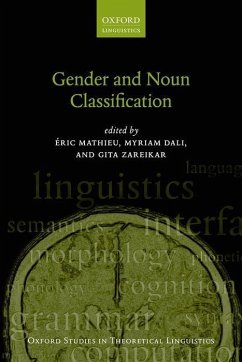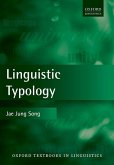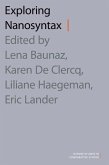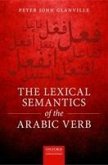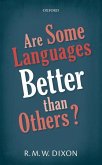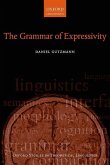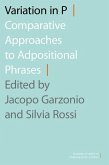Gender and Noun Classification
Herausgeber: Mathieu, Éric; Zareikar, Gita; Dali, Myriam
Gender and Noun Classification
Herausgeber: Mathieu, Éric; Zareikar, Gita; Dali, Myriam
- Broschiertes Buch
- Merkliste
- Auf die Merkliste
- Bewerten Bewerten
- Teilen
- Produkt teilen
- Produkterinnerung
- Produkterinnerung
This volume explores the many ways by which natural languages categorize nouns into genders or classes. The findings in the volume have significant implications for syntactic theory and theories of interpretation, and contribute to a greater understanding of the interplay between inflection and derivation.
Andere Kunden interessierten sich auch für
![Linguistic Typology Linguistic Typology]() Jae Jung SongLinguistic Typology53,99 €
Jae Jung SongLinguistic Typology53,99 €![Exploring Nanosyntax Exploring Nanosyntax]() Exploring Nanosyntax77,99 €
Exploring Nanosyntax77,99 €![The Lexical Semantics of the Arabic Verb The Lexical Semantics of the Arabic Verb]() Peter John GlanvilleThe Lexical Semantics of the Arabic Verb63,99 €
Peter John GlanvilleThe Lexical Semantics of the Arabic Verb63,99 €![Making Sense Making Sense]() David CrystalMaking Sense26,99 €
David CrystalMaking Sense26,99 €![Are Some Languages Better Than Others? Are Some Languages Better Than Others?]() R M W DixonAre Some Languages Better Than Others?37,99 €
R M W DixonAre Some Languages Better Than Others?37,99 €![The Grammar of Expressivity The Grammar of Expressivity]() Daniel GutzmannThe Grammar of Expressivity60,99 €
Daniel GutzmannThe Grammar of Expressivity60,99 €![Variation in P Variation in P]() Variation in P80,99 €
Variation in P80,99 €-
-
-
This volume explores the many ways by which natural languages categorize nouns into genders or classes. The findings in the volume have significant implications for syntactic theory and theories of interpretation, and contribute to a greater understanding of the interplay between inflection and derivation.
Produktdetails
- Produktdetails
- Verlag: Oxford University Press, USA
- Seitenzahl: 336
- Erscheinungstermin: 15. Januar 2019
- Englisch
- Abmessung: 231mm x 155mm x 23mm
- Gewicht: 499g
- ISBN-13: 9780198828112
- ISBN-10: 019882811X
- Artikelnr.: 52905671
- Verlag: Oxford University Press, USA
- Seitenzahl: 336
- Erscheinungstermin: 15. Januar 2019
- Englisch
- Abmessung: 231mm x 155mm x 23mm
- Gewicht: 499g
- ISBN-13: 9780198828112
- ISBN-10: 019882811X
- Artikelnr.: 52905671
Éric Mathieu is Professor in the Department of Linguistics at the University of Ottawa. His research focuses on French (Modern and Old) and the Algonquian language Ojibwe. His work has appeared in journals such as Linguistic Inquiry, Natural Language and Linguistic Theory, Lingua, and Probus, and he is the co-editor, with Robert Truswell, of Micro-change and Macro-change in Diachronic Syntax (OUP, 2017). Myriam Dali is a PhD student at the University of Ottawa. Her research interests include the syntax and semantics of number and gender, the structure of the DP, the singulative, and the diachronic evolution of number marking systems. She has recently worked on the competition between plural forms in Tunisian Arabic. Her work has been published in Lingvisticae Investigationes and she has a book in preparation with John Benjamins. Gita Zareikar is a PhD candidate at the University of Ottawa. Her research interests include the syntax and semantics of bare nominals and number interpretation in general number languages. She focuses on the syntax of noun phrases and more specifically on the evolution of classifiers in non-numeral-classifier languages. She has recently been working on telicity and viewpoint aspect and its interaction with number and specificity. Her work has been published in Linguistic Variation and in the conference proceedings of NELS 46 and CLA 2015.
* 1: Éric Mathieu: Humans, gods, and demons
* Part I. Gender and partition
* 2: Rose-Marie Déchaine: Partitioning the nominal domain: The
convergence of morphology, syntax, semantics, and pragmatics
* 3: Paolo Acquaviva: Categorization as noun construction: Gender,
number, and entity types
* Part II. Locus of gender
* 4: Abdelkader Fassi Fehri: Multiple facets of constructional Arabic
Gender and 'functional universalism' in the DP
* 5: Christopher Hammerly: Limiting gender
* 6: Ivona Küerová: The double life of gender and its structural
consequences: A case study from Standard Italian
* 7: Danniel da Silva Carvalho: On gender and agreement in Brazilian
Portuguese
* 8: Ruth Kramer: A novel kind of gender syncretism
* 9: Phoevos Panagiotidis: (Grammatical) gender troubles and the gender
of pronouns
* Part III. Morphosemantic noun classification
* 10: Clarissa Forbes: Number, names, and animacy: Nominal classes and
plural interactions in Gitksan
* 11: Maria Kouneli: Plural marking on mass nouns: Evidence from Greek
* 12: Conor McDonough Quinn: Productivity vs. predictability: Evidence
for the syntax and semantics of Animate gender in four
Northeastern-area Algonquian languages
* 13: Solveiga Armoskaite: How to phraseologize nominal number
* References
* Index
* Part I. Gender and partition
* 2: Rose-Marie Déchaine: Partitioning the nominal domain: The
convergence of morphology, syntax, semantics, and pragmatics
* 3: Paolo Acquaviva: Categorization as noun construction: Gender,
number, and entity types
* Part II. Locus of gender
* 4: Abdelkader Fassi Fehri: Multiple facets of constructional Arabic
Gender and 'functional universalism' in the DP
* 5: Christopher Hammerly: Limiting gender
* 6: Ivona Küerová: The double life of gender and its structural
consequences: A case study from Standard Italian
* 7: Danniel da Silva Carvalho: On gender and agreement in Brazilian
Portuguese
* 8: Ruth Kramer: A novel kind of gender syncretism
* 9: Phoevos Panagiotidis: (Grammatical) gender troubles and the gender
of pronouns
* Part III. Morphosemantic noun classification
* 10: Clarissa Forbes: Number, names, and animacy: Nominal classes and
plural interactions in Gitksan
* 11: Maria Kouneli: Plural marking on mass nouns: Evidence from Greek
* 12: Conor McDonough Quinn: Productivity vs. predictability: Evidence
for the syntax and semantics of Animate gender in four
Northeastern-area Algonquian languages
* 13: Solveiga Armoskaite: How to phraseologize nominal number
* References
* Index
* 1: Éric Mathieu: Humans, gods, and demons
* Part I. Gender and partition
* 2: Rose-Marie Déchaine: Partitioning the nominal domain: The
convergence of morphology, syntax, semantics, and pragmatics
* 3: Paolo Acquaviva: Categorization as noun construction: Gender,
number, and entity types
* Part II. Locus of gender
* 4: Abdelkader Fassi Fehri: Multiple facets of constructional Arabic
Gender and 'functional universalism' in the DP
* 5: Christopher Hammerly: Limiting gender
* 6: Ivona Küerová: The double life of gender and its structural
consequences: A case study from Standard Italian
* 7: Danniel da Silva Carvalho: On gender and agreement in Brazilian
Portuguese
* 8: Ruth Kramer: A novel kind of gender syncretism
* 9: Phoevos Panagiotidis: (Grammatical) gender troubles and the gender
of pronouns
* Part III. Morphosemantic noun classification
* 10: Clarissa Forbes: Number, names, and animacy: Nominal classes and
plural interactions in Gitksan
* 11: Maria Kouneli: Plural marking on mass nouns: Evidence from Greek
* 12: Conor McDonough Quinn: Productivity vs. predictability: Evidence
for the syntax and semantics of Animate gender in four
Northeastern-area Algonquian languages
* 13: Solveiga Armoskaite: How to phraseologize nominal number
* References
* Index
* Part I. Gender and partition
* 2: Rose-Marie Déchaine: Partitioning the nominal domain: The
convergence of morphology, syntax, semantics, and pragmatics
* 3: Paolo Acquaviva: Categorization as noun construction: Gender,
number, and entity types
* Part II. Locus of gender
* 4: Abdelkader Fassi Fehri: Multiple facets of constructional Arabic
Gender and 'functional universalism' in the DP
* 5: Christopher Hammerly: Limiting gender
* 6: Ivona Küerová: The double life of gender and its structural
consequences: A case study from Standard Italian
* 7: Danniel da Silva Carvalho: On gender and agreement in Brazilian
Portuguese
* 8: Ruth Kramer: A novel kind of gender syncretism
* 9: Phoevos Panagiotidis: (Grammatical) gender troubles and the gender
of pronouns
* Part III. Morphosemantic noun classification
* 10: Clarissa Forbes: Number, names, and animacy: Nominal classes and
plural interactions in Gitksan
* 11: Maria Kouneli: Plural marking on mass nouns: Evidence from Greek
* 12: Conor McDonough Quinn: Productivity vs. predictability: Evidence
for the syntax and semantics of Animate gender in four
Northeastern-area Algonquian languages
* 13: Solveiga Armoskaite: How to phraseologize nominal number
* References
* Index

